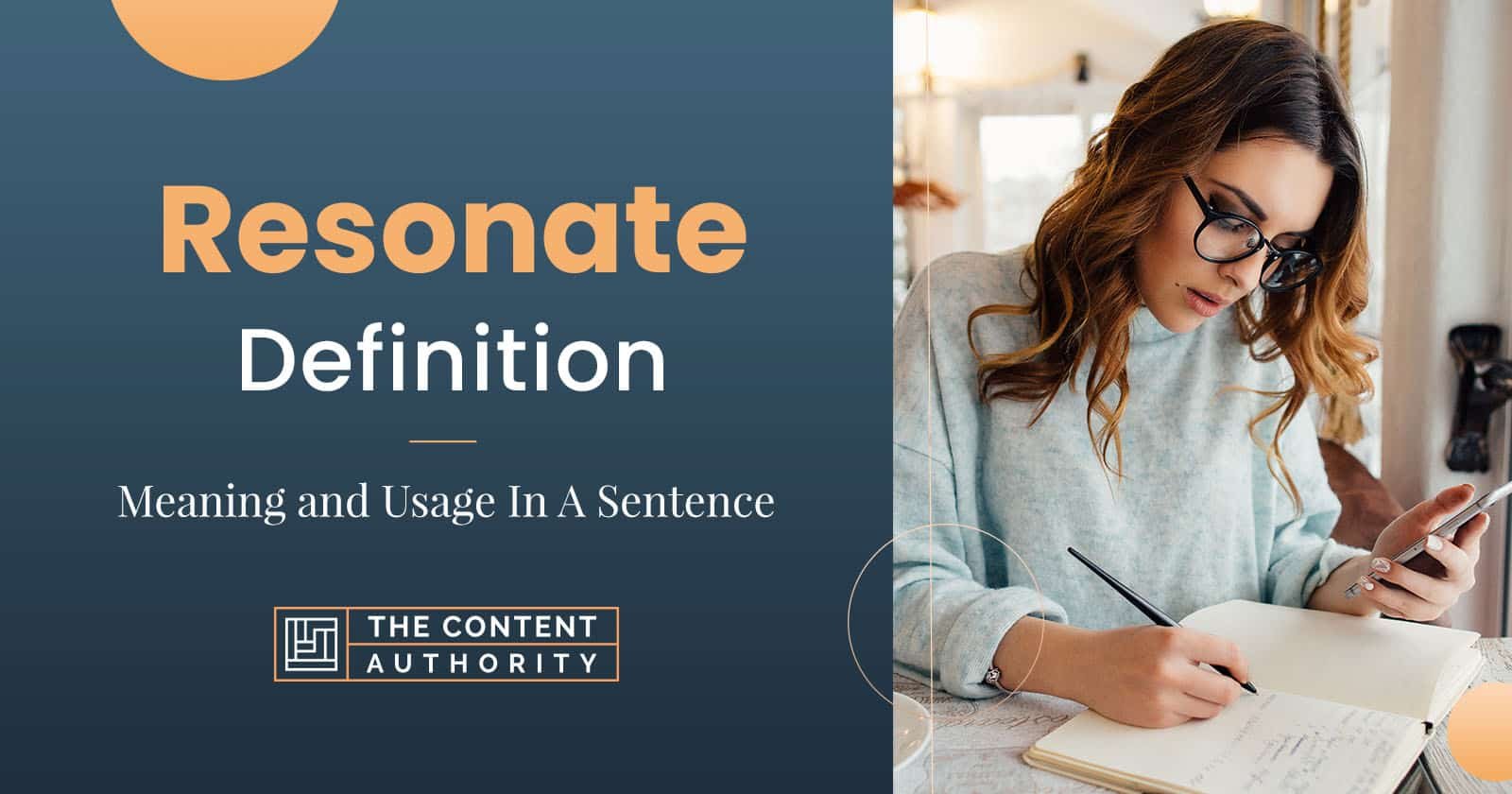Have you ever been to an event but missed a chance to catch up with most of your friends due to the “resonate” sounds at the party arena? You are probably wondering what the word “resonate” means, especially if you’ve come across it for the very first time. In this article, we will share with you the “resonate definition, meaning, and usage.”
Resonate: to produce or fill with deep clear sound that continues for a while. This is where some sounds and vibrations go on without breaking. “Resonate” in sentences describe both pleasant and unpleasant sounds as long as it has gone on for a long time. A good example is echoing.
In the first paragraph, the word “resonate” referred to the loud music that was going on in the venue to the extent that it made it challenging to hold proper conversations. However, the English language uses the word “resonate” for many reasons, significantly when the contexts vary. We will discuss this word more, especially its meanings, pronunciations, history, and everything in between.
What Is the Definition of Resonate?
Resonate: To receive or understand. Use this word to describe something one hears, makes, or understands. In most cases, people use the word when describing something that makes sense. It can also tell something that seems essential or good to people.
Describe someone or something as” resonate” if they evoke a feeling of shared emotion or belief. Use the word to describe something that you understand or feel deeply connected with. It doesn’t matter the situation; if you resonate well with people, it will show from how you relate. Learn more about this word below.
Example sentences:
- The blind senator’s policies resonate with most disabled citizens as they understand each other.
- If you want your story to resonate with today’s audience, it should be about social media and its impact.
- I was happy to meet a student whose ideas resonate with my research.
What Does The Phrase Resonate With Me Mean?
If you have come across the word phrase “resonate with me,” here is the meaning and the usage. For something to resonate with another, it needs to hit an emotional level that you can relate to. “Resonate with me” means that something evokes a feeling of familiarity within you. Depending on the issue, it can even inspire you to take action. Use the phrase when talking about something that got you emotional.
Example sentences:
- I love it when the students resonate with their team leaders.
- You need to resonate with your new boss to complete this project on time.
What Is the Meaning of Resonate?
Resonate: To vibrate or sound, especially in response to another vibration. When describing a sound that responds to another sound or vibration, use this word.
Sounds are produced in various scenarios. Whether it’s from political or musical stadiums, empty rooms, or deep in the forest, echoes produced are best explained with this word. The same applies when heavy objects fall on the ground and there are vibrations. Read the sentences below to understand this meaning more.
Example sentences:
- The flower vase on top of the piano will resonate when Brian plays certain notes.
- The stadium was full, and you could hear some resonate sound whenever the performances commenced.
- The kids clapping at the end arena are the source of those resonate sounds.
Words With Similar or Near Meanings to Resonate
Do you know that some words have almost similar meaning to “resonate?” Some can be interchanged in suitable contexts. They include:
- Echo
- Sound
- Pulsate
- Vibrate
- Reproduce
- Ring
- Pit pat
- Rumble
- Tally
- Fit
Words That Are the Opposite Resonate
There’s also a category of words that are the strict opposite of resonate. These words include the following:
Words That Have the Same Sound Resonate
When it comes to the similarity in sounds, the below words should be the best choices. The similarity in sounds is brought about by almost identical syllables.
- Aggregate
- Intimate
- Replicate
- Advocate
- Translate
- Dominate
- Legitimate
- Percolate
- Emulate
- Elevate
How to Use Resonate in a Sentence
When using “resonate” in relation to sound, note that the word means that a single lasting sound was produced that led to more sound effects. On the other hand, you use the word to describe relationships that relate harmoniously.
You can also use this word in different forms. Don’t hesitate to use the word when the tense changes because failure to do so will have you use the wrong word, distorting your message. Let’s look at the tenses and primary word forms in the next section.
Tenses of the Word Resonate
You don’t have to use this word in its original form all the time. Whenever you change the tense in your speech or writing, make sure you adjust the word. It’s the best way to ensure your sentences make sense. Learn about the various tenses of the word resonate below.
- Past tense: Resonated
- Present participle: Resonating
- Past participle: Resonated
- Third-person singular simple present: Resonates
Different Parts of Speech of the Word Resonate
When learning a new word, it is also vital to know the different parts of speech. The part of speech shows how to use the word in diverse sentences. Note that some words have a single part of speech while others have several parts. Here is a look at the various parts of speech from the word resonate.
Resonantly (Adverb): In a resonate manner. Read some example sentences below.
- When the sound system went down, the song they chose to sing was resonantly complementing what was happening; compared to the song they wanted.
- An assumption is that the biological system interacts resonantly with the microwave fields, but there is insufficient evidence to support this statement.
Resonant (Adjective): Resounding or echoing. Read some example sentences below.
- The doctor said that Tim has a resonant cough and slight vibration, which might be a sign of lung infection.
- Our teacher gave us resonant speeches to listen to past politicians and then do a report on the issue.
- The resonant cheer from the spectators after the team won the race reflected the school spirit.
Resonance (Noun): the condition of being resonant. Read some example sentences below.
- Magdalene was in a state of resonance each time she saw the old photo of their grandparents.
- The song sounded more powerful than the original due to the resonance of the singer’s deep vocals.
- When you play the flutes and violin together, the resonance sound makes the music sweet.
10+ Examples of Resonate in a Sentence
Get a better understanding of “resonate” by reading sentences with this phrase. Here are en example sentences to start with.
- I resonate with the idea in a big way, and I plan to implement it in my next schedule.
- You can make your story resonate with your students by showing them the animation film.
- One culture shock that my kids got when we were in Dubai is the guard-like mask inside which the voices resonate.
- Similar tune forms are brought together to resonate and reinforce each other.
- The new politician has a message that might resonate with the voters.
- Beth’s experiences resonate well with me since I’m in a similar situation.
- Every writer should resonate with the simple stories to bring out complicated themes.
- When a writer focuses on content readability, it will help the content to resonate with more people.
- Though everyone likes our new principal, I don’t resonate with her beliefs and emotions.
- Sherri had a lot of social media clout because the words she writes resonate with a lot of people online.
- It’s awkward that colors with no similarities resonate well with each other.
- The way the rings are designed, they resonate more often at high frequency.
How Do You Spell Resonate?
The proper way to spell this word is “R.E.S.O.N.A.T.E.”
When spelling this word, always remember to include the last “e.” This is one of the mistakes that people make. Note that misspelling the word will lead to people misunderstanding you or the statement you plan to pass across.
How Do You Pronounce Resonates?
The proper pronunciation of the word “resonate” is “rez-uh-next.”
It is vital to practice pronouncing the word. From this, it can be easy for people to understand you when you use the word in your speech.
How Many Syllables Are In Resonate?
The word “resonate” has three syllables divided as “res-o-nate.”
 History & Etymology of Resonate
History & Etymology of Resonate
The origin of the word “resonate” is Latin “resonare.” However, as the Latin language evolved, the word changed to “resonate.” Later the English borrowed the word and used it as “resonate.” The term has since remained the same over the years.
When Was Resonate First Used?
The first record of the word is in 1873, meaning “to produce or exhibit resonance.”
Conclusion
“Resonate” is one of those words with numerous meanings, and you’re likely to come across the word quite often. But here’s the thing: make sure you understand the different meanings and the best way to use the word in your sentences. Now that you have understood the meanings of the word “resonate,” we would like to hear from you about why you have been interested in the word.
Shawn Manaher is the founder and CEO of The Content Authority. He’s one part content manager, one part writing ninja organizer, and two parts leader of top content creators. You don’t even want to know what he calls pancakes.


